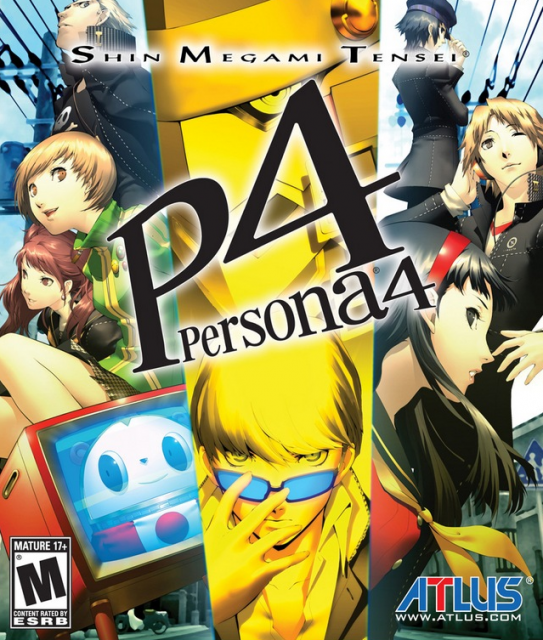Changing the channel back to PlayStation 2.
Whenever I go home for winter break, the games I play generally fall into the JRPG genre because they typically take around 40 hours to beat. Aside from Valkyria Chronicles and Chrono Trigger DS, the only other game I managed to complete was Shin Megami Tensei: Persona 4. After spending 70 hours with my eyes glued to screen, I beat the final boss, set down the controller and said, “This… is the best game of 2008.” While zealots of high-budget productions may declare me insane for loving a PlayStation 2 game, what’s even more insane is that I played it for a second time immediately after watching the credits roll. Out of the 60+ games I beat over the course of 2008, I finally found my game of the year.
Persona 4 takes place in Inaba, a Japanese rural town in the middle of nowhere, and a serial murder case plaguing the town with unexplainable events. The nameless protagonist, who recently moved from the city, finds himself stuck in the middle of the town’s mysteries thanks to a spreading rumor about the Midnight Channel, a special program that only shows on rainy nights when a TV is off. The bizarre channel, coupled with the protagonist’s newfound ability to enter TVs, unravels a hidden side to the recent murders. Due to the supernatural and unbelievable nature of the Midnight Channel, the protagonist and his classmates decide to forego help from the police and task themselves with finding the serial killer.
While the plot is setup with nothing but a bunch of convenient coincidences, Shin Megami Tensei (Megaten) games have always messed with the players’ minds right from the get-go. However, the writers did an excellent job of explaining everything from the murders to how the protagonist stumbled upon his abilities. Additionally, the story touches on numerous real-life issues such as repressed teenage feelings, struggling small businesses and homosexuality. It’s not exactly worthy of the Pulitzer Prize, but the underlying mythological symbolism makes the story open to both debate and intellectual interpretation. I felt more fulfilled beating Persona 4 than I was after beating 2007’s Bioshock, a game that practically suffocated under its own philosophical backdrop.
An excellent story doesn’t make a game great; yet Persona 4 would still be good even if the story were a sporadic scribbling of a second grader. The gameplay, much like the story, is remarkable. During my short employment at GameStop, I remember that my supervisor said Persona was “Pokémon for adults”, and I couldn’t agree more. A large part of the game takes place in dungeons where characters would level up, collect personas (summoned monsters) and fight enemies called Shadows. The dungeons gradually get harder and the later ones require very specific strategies in order to get through them. Persona 4 is by no means an easy game and demands a moderate amount of tolerance and patience towards the end.
Outside of the dungeons, the protagonist lives a normal school life rife with tests, extracurricular activities and the occasional romantic encounter. This part may sound boring, but it was my favorite part of the game because the various actions and decisions made during this time affected dungeon sequences. Whether it’s making friends with classmates or working a part-time job, almost everything has an effect on stat growth and overall character performance. Persona 4 is an uncanny combination of a role-playing game and a life simulation, but it works ridiculously well.
The only bad thing I have to say about Persona 4 concerns the graphics; though it’s not really much of an issue since it’s a PlayStation 2 game. The graphics are full of artistic zeal, but they don’t push the PS2’s capabilities all that much. On the other hand, I find it hard to make a case for that since everything about the presentation has a smooth feeling to it. Menus and animations pop in cleanly and the character art looks fantastic, especially when upscaled through a backwards-compatible PlayStation 3. The voice work is among the best I’ve ever heard and the localization is top-notch. The soundtrack consists of Japanese pop songs, simplistic orchestrations and not much else; the music is appropriate in context, and that’s all there is to it.
Looking back on my time spent playing Persona 4, I can honestly say that the 140 hours I poured into it (no exaggeration) was an absolute joy from beginning to end. As much as I can beg people to buy this game, I know Persona 4 will be overlooked in favor of other series like Final Fantasy or Kingdom Hearts. In my opinion, I think this is the greatest game to come out of the PS2’s library of over 1800 games; yes, I can have overblown beliefs too. JRPG fans [and video game fans in general] unwilling to give this a shot are doing themselves a great disservice. I can do nothing but hang my head in shame knowing that the pomp and circumstance of shiny graphics and kick-ass guns wins the hearts of most gamers nowadays. Nevertheless, Shin Megami Tensei: Persona 4 will forever stand as my favorite game of 2008.
